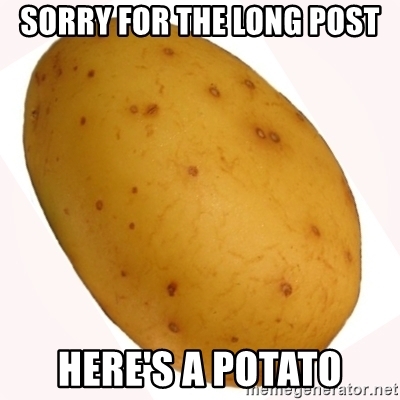Sara
Oct 28, 2020
Please welcome Dr. Sara El-Gebali, @yalahowy
Founder of @OpenCider - Open Computational Inclusion and Digital Equity Resource
Oct 28 to Nov 04 on @imakefoss
Interview: https://t.co/rB6dTeLhTM
@imakefoss is a Twitter rotation curation account. https://t.co/nWbgn3IV6H
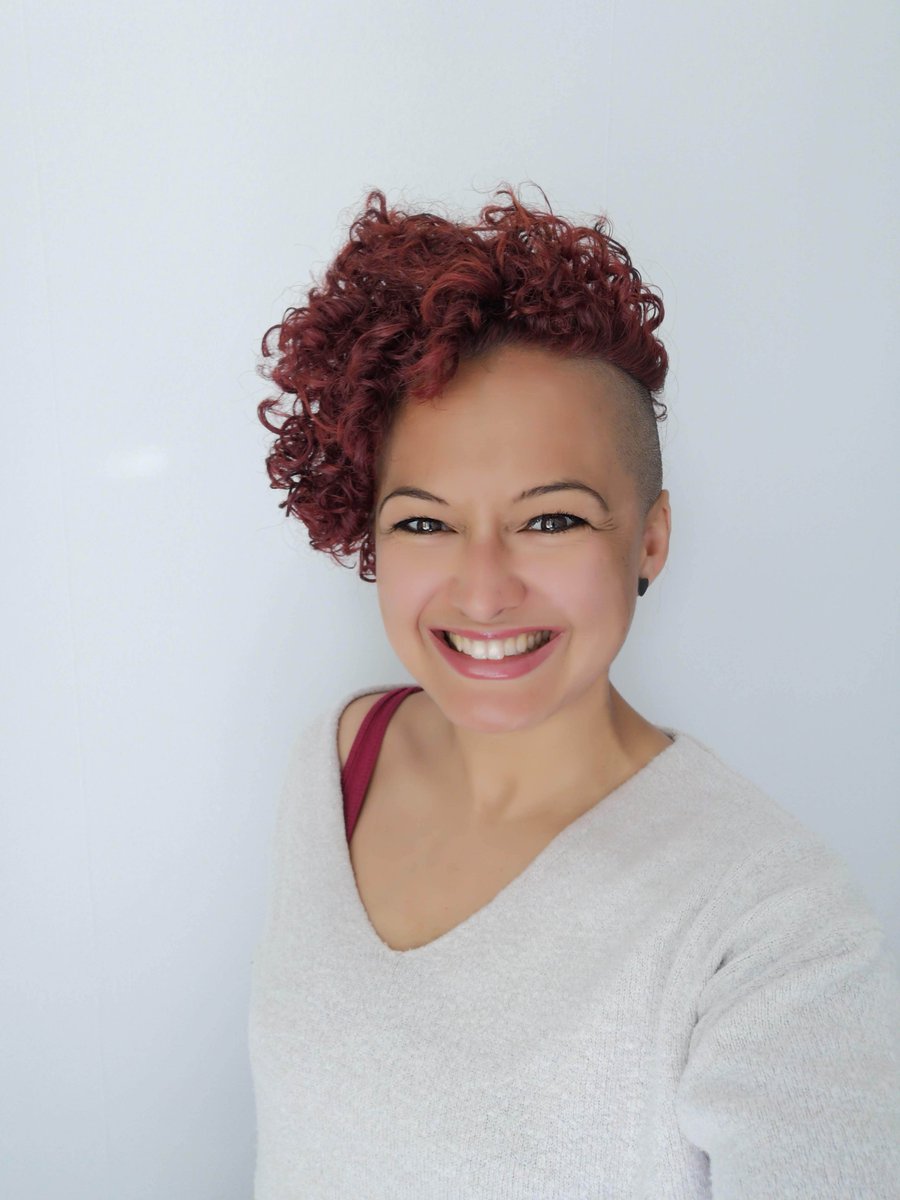
Oct 28, 2020
Thank you all for having me, I’m looking forward to spending this week with you! Here are some of the things I’m passionate about and would love to share with you 💜 Feel Free to add suggestions below ⤵⤵⤵
- Sara @yalahowy @OpenCIDER https://t.co/ylzrokAuk7
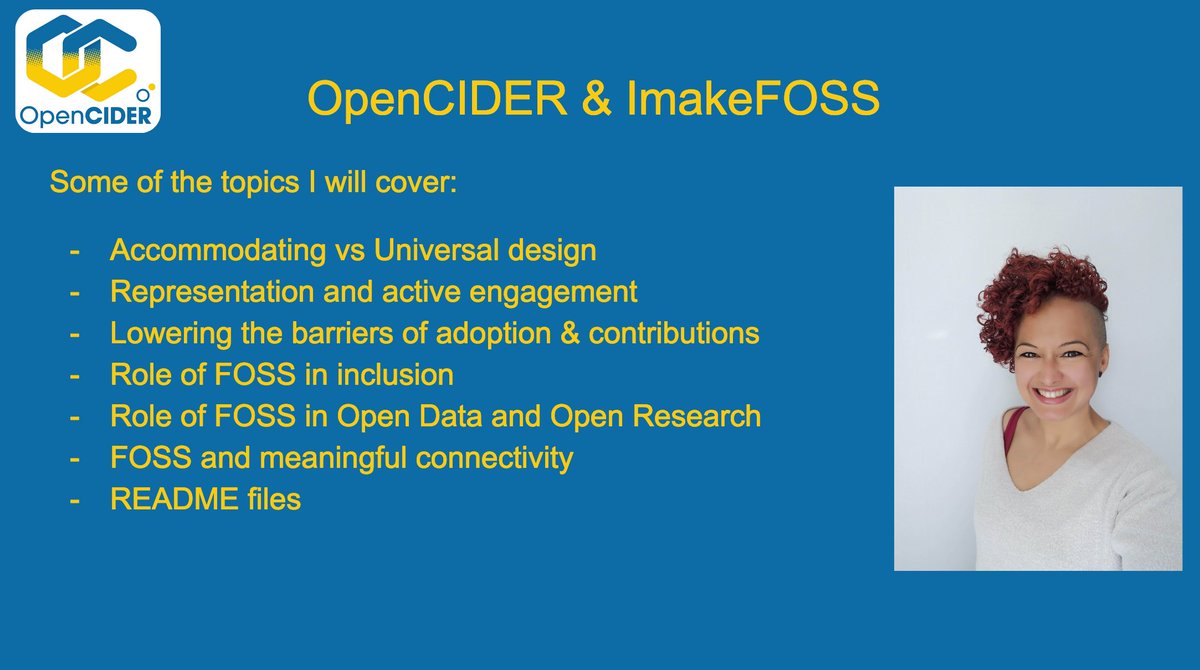
Oct 28, 2020
Hey FOSS Folks! Let’s get to know each other! ⤵ ⤵ No pressure to answer everything, feel free to just say hi 👋🏽 Find my answers in the thread below! https://t.co/YFstfRdnYW
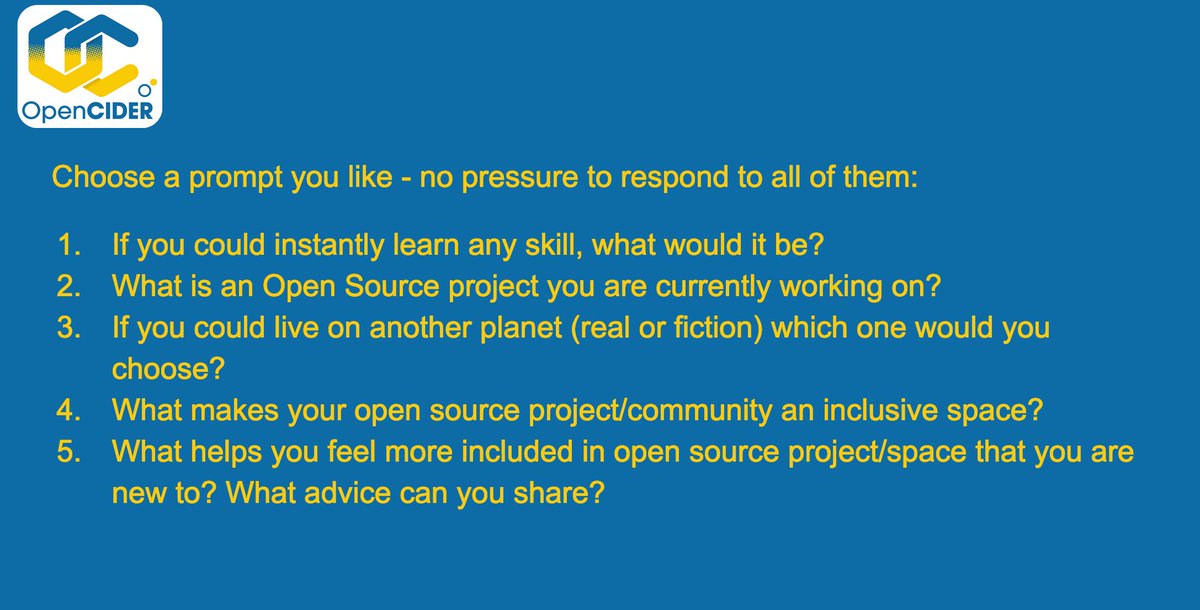
Oct 28, 2020
1- Learn any language instantly, German & Russian 1st. 🔠 2- @OpenCIDER 3- RISA-StarTrek https://t.co/OdMD986rZ9
Oct 28, 2020
@OpenCIDER 4- Active engagement of folks who might be shy or unsure if they can contribute
Oct 28, 2020
@OpenCIDER 5- When organizers of a space emphasize; ➡ We have a Code of Conduct and we STICK by it and here is what happens if you don’t! ➡ Equally so, when you are actively encourage to speak up and made safe to do so!
Oct 28, 2020
@OpenCIDER -Sara @yalahowy @OpenCIDER
Oct 29, 2020
Good Morning Foss Folks!Today I’d like to address the topic; diversity in open source, and Why, What, How and Do’s and Don’ts. -Sara @yalahowy @OpenCIDER
Oct 29, 2020
@yalahowy @OpenCIDER I am gonna rope in the expert on the subject @jflory7 @jwf_foss
🤭 Sorry Not Sorry! -Sara @yalahowy @OpenCIDER
Oct 29, 2020
Why am I talking about diversity in open source? Open source has a problem! don’t believe me? here are some numbers: In 2017 over 5500 respondents were surveyed from over 3,800 open source repositories on https://t.co/Tac8MtqKGu.
- Sara @yalahowy @OpenCIDER
Oct 29, 2020
@yalahowy @OpenCIDER Here is what they found; ~ 95% of respondents are men; just 3% are women and 1% are non-binary. ~ 26% are immigrants (from and to anywhere in the world) and 16% are members of ethnic or national minorities in the country where they currently live. https://t.co/OCPTEemVJl
Oct 29, 2020
@yalahowy @OpenCIDER Unlike projects with structured governance, HR staff and the whole lot, Open Source rely on volunteered time, collaboration and community. But we tend to suffer from intergroup bias. Meaning that, most of the time, we find it easier to work with people we perceive as similar.
Oct 29, 2020
Think about it; how many open source projects started because we spoke to our friends about an idea in our head and got them so hyped up that they decided to work on it together? -Sara @yalahowy @OpenCIDER
Oct 29, 2020
We are not bad people, for wanting to get creative with our friends.🎳 It is the WHY that needs challenging. Why do we choose specific people to work with? -Sara @yalahowy @OpenCIDER
Oct 29, 2020
@yalahowy @OpenCIDER On one hand, it can be that we genuinely have common interests, on the other hand, we simply might want to believe that we do (perceived similarity). -Sara
Oct 29, 2020
@yalahowy @OpenCIDER The former is an advantage, the later is a disadvantage. Perceived similarity can be misleading and hinder us from making new connections, i.e. stuck in the comfort zone. 🛌
Oct 29, 2020
@yalahowy @OpenCIDER It can also contribute to consensual validation or echo chamber effect, we will end up hearing what we approve of and resonate with us.
Oct 29, 2020
@yalahowy @OpenCIDER All I’m saying is, we are not bad people for wanting to play with our friends, but we need to actively expand our circle if we want to grow 🌱
Oct 30, 2020
Dear FOSSers! Thank you for your contributions to Open source. What is the the funniest/weirdest project you worked on or what was the project that you did just for the fun of it? 👇👇
Oct 30, 2020
On a more serious note, I’d like to talk about potatoes 🍠 !!
Oct 30, 2020
Our future is built on Open source so is our present ~78% of companies run on open source.
Oct 30, 2020
But what does this mean for communities? I can make a comment on scientific communities and what open source tools has meant for them- Please share what does OS mean for you and your community? 👇
Oct 30, 2020
While most of us have integrated it seamlessly in our lives, a large portion of communities worldwide are struggling with the adoption, despite of the major advantages that opensource brings to researchers
Oct 30, 2020
,i.e. being able to analyze their own data, furthering research that is relevant to their communities, addressing their issues, leading to potential solutions.
Oct 30, 2020
For example, did you know that Peru has over 350 different types of potatoes? They even have a dedicated International potato center
https://t.co/8ytJLl5qa5
Oct 30, 2020
Both India and Latin America are major hubs for potato related research focused on viral infections among other topics, open source software means they don’t need to rely on external partners to analyse their data on their behalf.
Oct 30, 2020
But this is not always the case, as a matter of fact, a recent study analysing 242 digital tools increasingly being used by researchers in various disciplines shows that tool design plays a major role in limiting usage and accessibility. https://t.co/TZNIN8deu9
Oct 30, 2020
Can you think of what these factors might be? Share your thoughts with us 💜 -Sara @yalahowy @OpenCIDER
Oct 30, 2020
- Sara @yalahowy @OpenCIDER
Oct 31, 2020
Happy Halloween FOSS folks! 😈
Oct 31, 2020
@flukejones @jam1garner This is not something I worked on, but I found it funny nevertheless: https://t.co/OBm5SPtU6f
Nov 1, 2020
Why do you use or contribute to a particular open source solution? A- The Community B- The solution C- Other- tell us in the comments.
Nov 1, 2020
-Sara @yalahowy @OpenCIDER
Nov 1, 2020
@abortioncookies So just because it’s free? What about Open Source that gives it, it’s value?
Nov 2, 2020
Community in open source plays a huge role and may define it’s adoption and contribution rate. But when the community lacks representation from underrepresented minorities, it is exclusive by default. This is why #RepresentationMatters !!!
Nov 2, 2020
Simply put, if we want diverse ideas, novel and innovative contributions from diverse communities, we have to actively invest and achieve AUTHENTIC representation of many backgrounds. NOT to be confounded with tokenism!
Nov 2, 2020
I spoke of gender distribution in open source, let’s have a look at other demographics and consider what can WE do better? https://t.co/QZFaUffVOR https://t.co/V0vDMEyqhh
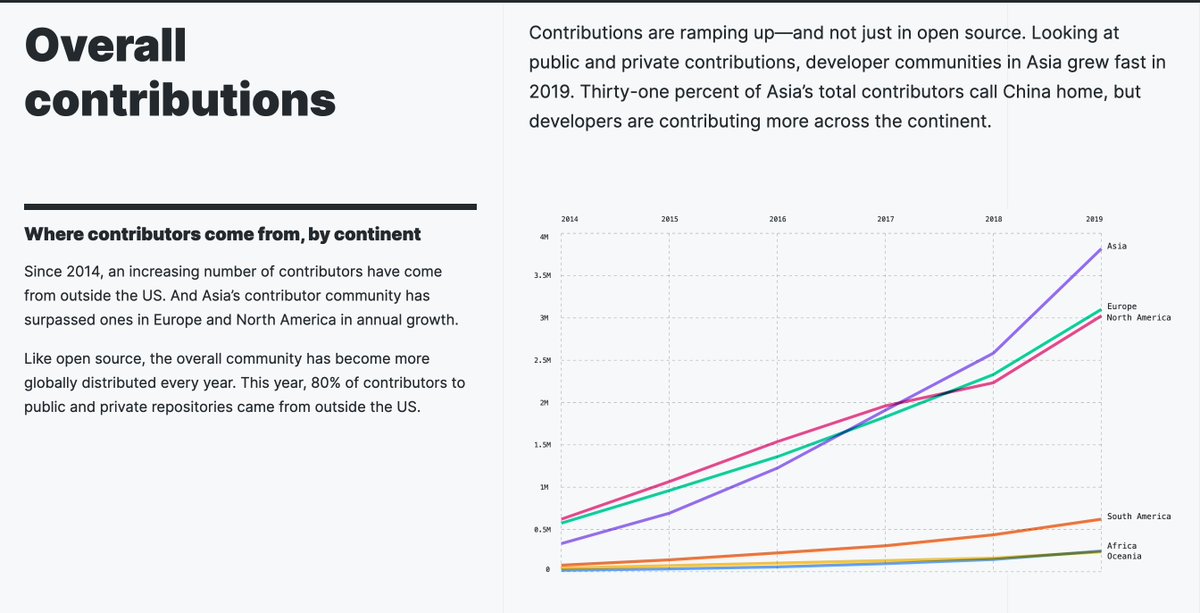
Nov 2, 2020
-Sara @yalahowy @OpenCIDER
Nov 2, 2020
Thank you all for your replies. Imo, community plays a major role! specially in OSS, where a tool without a community to maintain it is easily deprecated!
Nov 2, 2020
-Sara @yalahowy @OpenCIDER
Nov 3, 2020
Over the past few days, I’ve had the chance to raise the question of what we should consider and what can we do better to improve diversity in FOSS. Today I’d like to share with you some thoughts and ideas & would love to hear yours!
Nov 3, 2020
Do’s:
- Respect language barriers: Proper documentation for any new user is crucial. Unclear documentation with complicated language makes it harder for google translate and free translation services.Make sure, abbreviations are spelled out. #StopTheJargon
Nov 3, 2020
Can you explain a hard idea using only the ten hundred most used words? It’s not very easy. Type in the box to try it out. https://t.co/1YnvwcL14B
Nov 3, 2020
On the theme of documentation, a README file is the gateway to your project. It needs to be descriptive and simple, to make it easier to the user at a first glance whether it fits their needs or not, again, translation services would make it more accessible.
Nov 3, 2020
README needs to tell us; What is the project about? How to get started?Who maintains? And how to contribute?
Nov 3, 2020
Do’s:
-
Create a safe space, people can learn without judgement, start by having a Code of Conduct. Personally I love these: The social rules are:
No well-actually’s No feigned surprise No backseat driving No subtle -isms https://t.co/MQvi62EW0l
Nov 3, 2020
Do’s:
- Make it worth it, not everyone has the privilege of being able to volunteer. Acknowledge contribution!
Nov 3, 2020
Do’s:
- Consider universal designing vs accommodating design. ‘Universal design, a proactive approach to making facilities, information resources, and instruction welcoming to, accessible to, and usable by everyone is called universal design (UD)" https://t.co/e9Oes7ONSd
Nov 3, 2020
Accommodating design is a reactive approach in response to a specific need.
Nov 3, 2020
Do’s:
- Invest in the process of onboarding new members. https://t.co/gQS1q7uI4o https://t.co/6ruXloGCZD
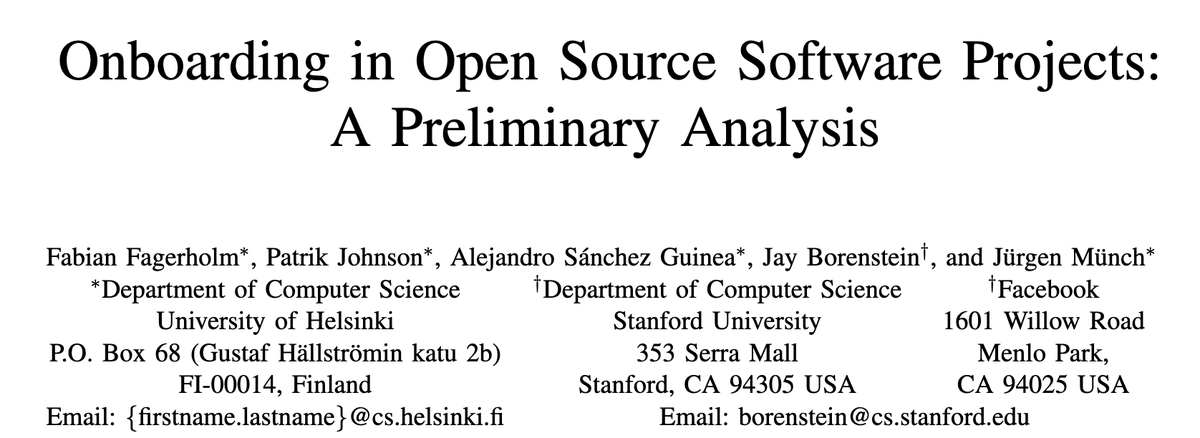
Nov 3, 2020
Do’s: I Can’t stress this enough ⬇⬇
- Challenging meritocratic ideology: Words Matter – Moving Beyond “Meritocracy”:
Nov 3, 2020
Do’s: Finally; Be mindful of your own biases and actively challenge them! https://t.co/7WCjjucy8O
-Sara @yalahowy @OpenCIDER
Nov 3, 2020
-Sara @yalahowy @OpenCIDER
Nov 4, 2020
Dear all, Thank you for having me this past week! It has been a wonderful opportunity and I’m looking forward to many more future discussions with your embracing community!
Nov 4, 2020
I hand over the 🎙 to the amazing @EriolDoesDesign. I leave you with the words of @timberners_lee ‘Inequality and poverty are about more than income – they are also about information." -Sara @yalahowy @OpenCIDER
Nov 4, 2020
@j_colomb Thank you for sharing 💜
